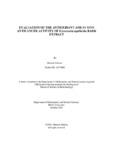Evaluation of the antioxidant and in vivo anticancer activity of Excoecaria agallocha bark extract

View/Open
Date
2019-10Publisher
Brac UniversityAuthor
Sultana, SharminMetadata
Show full item recordAbstract
Mangrove ecosystems have been known to possess diverse secondary metabolites and a good number of bioactive compounds of pharmaceutical importance have been reported from the mangrove plants. Mangrove plants are biochemically unique, producing wide array of natural products with unique bioactivity. This study was undertaken to evaluate the in vitro antioxidant and in vivo anticancer activity of Excoecaria agallocha (bark) which is a mangrove plant. E. agallocha possess various therapeutically important properties and their different parts have been experimented for antioxidant and anticancer activities in various studies. The objective of this study was to evaluate the bark extract of E. agallocha and to find their antioxidant content and also in vivo anticanceractivity in mice model. For this purpose, dried powdered bark of E. agallocha was extracted by kupchan method of solvent-solvent partitioning and after that polarity band was observed by Thin layer of Chromatography (TLC). In thein vitro antioxidant activity test, the extracts were tested for CUPRAC reducing capacity, total antioxidant capacity, total phenolic content and total flavonoid content. Where, Methanolic bark extract showed highest antioxidant content than other solvent extracts. After that anticancer activity was done in mice model, where comparison of the body weight among the groups of mice and hematological parameters was measured by analyzing clinical tests. In sub-chronic toxicity study, methanolic bark extracts of E. agallocha did not produce any significant changes in body weight of mice model when compared to both control groups (negative and positive) of mice. Moreover, there was significant rising of serum SGPT level during the treatment with the plant extract at a drug 400 mg/kg, but no significant changes were observed with 200 mg/kg dose, indicating no acute or sub-chronic toxicity of the extract. In conclusion, E. agallocha bark extract can be considered as a potential anticancer compound which should be validated from other animal model trials. Further studies are required to fractionate the extract, to identify the bioactive compounds, and which may be directed to carry out in vivo studies of its medicinal active components.
